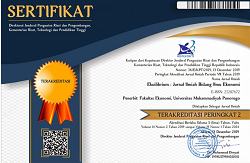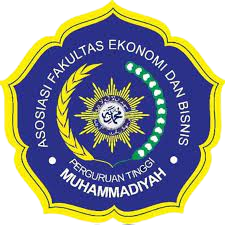Does Management Efficiency have any Influence on Job Satisfaction?
DOI: 10.24269/ekuilibrium.v19i2.2024.pp260-275
Abstract
Recently, there has been a growing global need for washing services worldwide. This surge has significantly influenced the growth of washing enterprises in all nations, including Indonesia. Nevertheless, this nation's expansion of the laundry sector has led to fierce rivalry. Many laundry businesses have failed to compete because they could not effectively implement efficient human resource management. This study aims to analyze the impact of efficiency management on employee satisfaction by identifying remedies to maintain the sustainability of the laundry sector. This study primarily examines the management of human resource efficiency, emphasizing four dimensions: leadership style, work environment, rewards, and work motivation. This study examines the role of employee performance accomplishment as a mediator. This study uses structural equation modeling (SEM) approaches to quantitatively test data from 135 respondents. The results of this study suggest that the leadership style, work environment, and rewards that align with employee preferences have a substantial impact on employee job satisfaction. It means that efficient human resource management that emphasizes these three dimensions is critical to the success of laundry businesses facing intense competition. Theoretically, this study has successfully addressed the gap in previous studies. Practically, this study can provide valuable information to practitioners in enhancing the competitive edge of their laundry business.
Keywords
References
- Abdullahi, A. K., Mosanya, A. U., Bello, N., & Musa, M. K. (2023). Evaluation of job satisfaction among pharmacists working in public health facilities. Exploratory Research in Clinical and Social Pharmacy, 12, 100338. https://doi.org/10.1016/j.rcsop.2023.100338
- Ali, M., & Dafous, M. (2024). Validation of a Generic Job Satisfaction Scale Among Libyan Arabs: Exploring its Association with Mental Health Outcomes. Clinical Epidemiology and Global Health, 101699. https://doi.org/10.1016/j.cegh.2024.101699
- Arshadi, N. (2010). Basic need satisfaction, work motivation, and job performance in an industrial company in Iran. Procedia - Social and Behavioral Sciences, 5, 1267–1272. https://doi.org/10.1016/j.sbspro.2010.07.273
- Ashfaq, F., Abid, G., & Ilyas, S. (2023). Transformational leadership and life satisfaction: The sequential mediation model of organizational trust and proactive behavior. Scandinavian Journal of Management, 39(4), 101298. https://doi.org/10.1016/j.scaman.2023.101298
- Asro, A., & Istiharoh, I. (2023). Strategi Pengembangan Bisnis Laundry Berbasis Online. Prosiding Amal Insani Foundation, 2, 242-262. https://prosiding.amalinsani.org/index.php/semnas/article/view/58/70
- Awan, S. H., Habib, N., Akhtar, C. S., & Naveed, S. (2020). Effectiveness of Performance Management System for Employee Performance Through Engagement. SAGE Open, 10(4), 215824402096938. https://doi.org/10.1177/2158244020969383
- Ayuningtyas, E. D. P., & Widhianingrum, W. (2017). Peran Media Pembelajaran Terhadap Kinerja Dosen Dengan Gaya Kepemimpinan Transformasional Sebagai Variabel Moderating (Studi Kasus pada Dosen Universitas Muhammadiyah Ponorogo). Ekuilibrium : Jurnal Bidang Ilmu Ekonomi, 12(2), 153–162. https://doi.org/10.24269/ekuilibrium.v12i2.2017
- Bawono, M. (2018). Compensation Analysis on The Performance Of Employees Of The Public Work Of Civil Work And Regional Spatial District Nganjuk Regency. Ekuilibrium : Jurnal Bidang Ilmu Ekonomi, 13(2), 145–150. https://doi.org/10.24269/ekuilibrium.v13i2.2018
- Braunheim, L., Dragano, N., Khachatryan, K., Beutel, M. E., & Brähler, E. (2024). The effects of effort-reward imbalance on the job, overcommitment, and income on life satisfaction in Germany from a longitudinal perspective. Social Science & Medicine, 341, 116523. https://doi.org/10.1016/j.socscimed.2023.116523
- Bustamam, F. L., Teng, S. S., & Abdullah, F. Z. (2014). Reward Management and Job Satisfaction among Frontline Employees in Hotel Industry in Malaysia. Procedia - Social and Behavioral Sciences, 144, 392–402. https://doi.org/10.1016/j.sbspro.2014.07.308
- Che Ahmat, N. H., Arendt, S. W., & Russell, D. W. (2019). Effects of minimum wage policy implementation: Compensation, work behaviors, and quality of life. International Journal of Hospitality Management, 81, 229–238. https://doi.org/10.1016/j.ijhm.2019.04.019
- Choi, J. (2019). Let’s agree to disagree? The International Journal of Conflict Management/International Journal of Conflict Management. https://doi.org/10.1108/ijcma-02-2019-0037
- Choi, S. Y., Kim, H. R., & Myong, J. P. (2020). The Mediating Effects of Marital Intimacy and Work Satisfaction in the Relationship between Husbands’ Domestic Labor and Depressive Mood of Married Working Women. International Journal of Environmental Research and Public Health/International Journal of Environmental Research and Public Health, 17(12), 4547. https://doi.org/10.3390/ijerph17124547
- Chien, G. C. L., Mao, I., Nergui, E., & Chang, W. (2020). The effect of work motivation on employee performance: Empirical evidence from 4-star hotels in Mongolia. Journal of Human Resources in Hospitality & Tourism./Journal of Human Resources in Hospitality & Tourism, 19(4), 473–495. https://doi.org/10.1080/15332845.2020.1763766
- Dahleez, K. A., Aboramadan, M., & Abdelfattah, F. (2023). Inclusive leadership and job satisfaction in Omani higher education: the mediation of psychological ownership and employee thriving. International Journal of Educational Management, 37(4), 907–925. https://doi.org/10.1108/ijem-07-2022-0274
- Dartanto, T., Halimatussadiah, A., Rezki, J. F., Nurhasana, R., Siregar, C. H., Bintara, H., . . . Soeharno, R. (2019). Why Do Informal Sector Workers Not Pay the Premium Regularly? Evidence from the National Health Insurance System in Indonesia. Applied Health Economics and Health Policy, 18(1), 81–96. https://doi.org/10.1007/s40258-019-00518-y
- Davidescu, A. A., Apostu, S. A., Paul, A., & Casuneanu, I. (2020). Work Flexibility, Job Satisfaction, and Job Performance among Romanian Employees—Implications for Sustainable Human Resource Management. Sustainability, 12(15), 6086. https://doi.org/10.3390/su12156086
- Doğantekin, A., Boğan, E., & Dedeoğlu, B. B. (2023). The effect of customer incivility on employees’ work effort and intention to quit: Mediating role of job satisfaction. Tourism Management Perspectives, 45, 101071. https://doi.org/10.1016/j.tmp.2022.101071
- Egemen, M. (2024). Assessing the individual effects of different job satisfaction facets on the job performance of qualified employees in the unique conditions of the construction industry. Ain Shams Engineering Journal, 102789. https://doi.org/10.1016/j.asej.2024.102789
- Gani, A. A. (2020). Pengaruh Gaya Kepemimpinan Transformasional Dan Kepuasan Kerja Terhadap Kinerja Pegawai, 1(2), 12–22. https://doi.org/10.37541/eq.v1i2.381
- Ghozali, I. (2006). Partial Lest Square. Universitas Diponegoro Publishing. Semarang, Indonesia
- Hamsinah, Sunarsi, D., Narimawati, U., Munna, A. S., & Pawar, A. (2023). The Influence of Total Quality Management (TQM) and Organizational Culture on Employee Job Satisfaction that Impacts Employee Performance (Case Study on Cooperatives in South Tangerang City). Ekuilibrium : Jurnal Bidang Ilmu Ekonomi, 18(2), 156–168. https://doi.org/10.24269/ekuilibrium.v18i2.2023
- Hasanah, H., & Harisantoso, J. (2020). Pengaruh Kinerja dan Disiplin Kerja Terhadap Kepuasan Kerja Guru di Mts Negeri 1 Situbondo. Jurnal Pendidikan Dan Kewirausahaan, 7(2), 55–65. https://doi.org/10.47668/pkwu.v7i2.33
- Hayati, K., & Caniago, I. (2012). Islamic Work Ethic: The Role of Intrinsic Motivation, Job Satisfaction, Organizational Commitment and Job Performance. Procedia - Social and Behavioral Sciences, 65, 272–277. https://doi.org/10.1016/j.sbspro.2012.11.122
- Hendra, H. (2020). Pengaruh Budaya Organisasi, Pelatihan Dan Motivasi Terhadap Kinerja Karyawan Pada Universitas Tjut Nyak Dhien Medan. Maneggio: Jurnal Ilmiah Magister Manajemen, 3(1), 1–12. https://doi.org/10.30596/maneggio.v3i1.4813
- Hasle, P., Bojesen, A., Jensen, P. L., & Bramming, P. (2012). Lean and the working environment: a review of the literature. International Journal of Operations & Production Management, 32(7), 829–849. https://doi.org/10.1108/01443571211250103
- Irma, A., & Yusuf, M. (2020). Pengaruh lingkungan kerja terhadap kepuasan kerja pegawai. Jurnal Manajemen, 12(2), 253-258. https://journal.feb.unmul.ac.id/index.php/JURNALMANAJEMEN/article/view/7376
- Jaboob, M., Awain, A. M. S. B., & Al-Ansi, A. M. (2023). Sustaining employees’ creativity through the organizational justice: The mediating role of leadership styles. Social Sciences & Humanities Open, 8(1), 100693. https://doi.org/10.1016/j.ssaho.2023.100693
- Juhelti, J. (2023). Pengaruh Besarnya Pemberian Reward Terhadap Kinerja dan Motivasi Karyawan Mbok Laundry di Kota Pontianak. Andromeda, 1(1), 11-18. https://e-journal.iainptk.ac.id/index.php/andromeda/article/view/1939/581
- Kearney, T., Coughlan, J., & Kennedy, A. (2023). The influence of the physical work environment on retail employees. Journal of Services Marketing/the Journal of Services Marketing, 37(6), 719–731. https://doi.org/10.1108/jsm-04-2022-0130
- Kulakaç, N., & Uzun, S. (2023). The Effect of Burnout and Moral Sensitivity Levels of Surgical Unit Nurses on Job Satisfaction. Journal of PeriAnesthesia Nursing, 38(5), 768–772. https://doi.org/10.1016/j.jopan.2023.01.012
- Lestari, U. P., Sinambela, E. A., Mardikaningsih, R., & Darmawan, D. (2020). Pengaruh Efikasi Diri dan Lingkungan Kerja terhadap Kepuasan Kerja Karyawan. Jesya: Jurnal Ekonomi Dan Ekonomi Syariah, 3(2), 529-536. https://stiealwashliyahsibolga.ac.id/jurnal/index.php/jesya/article/view/615/290
- Mahajan, R., Lim, W. M., Sareen, M., Kumar, S., & Panwar, R. (2023). Stakeholder theory. Journal of Business Research, 166, 114104. https://doi.org/10.1016/j.jbusres.2023.114104
- Mahmoud, A. B., Fuxman, L., Mohr, I., Reisel, W. D., & Grigoriou, N. (2021). “We aren’t your reincarnation!” workplace motivation across X, Y and Z generations. International Journal of Manpower, 42(1), 193–209. https://doi.org/10.1108/ijm-09-2019-0448
- Mitchell, R., Schuster, L., & Jin, H. S. (2020). Gamification and the impact of extrinsic motivation on needs satisfaction: Making work fun? Journal of Business Research, 106, 323–330. https://doi.org/10.1016/j.jbusres.2018.11.022
- Martín, M., & Martínez, A. (2013). A methodology for simultaneous product and process design in the customer products industry: The case study of the laundry business. Computer Aided Chemical Engineering, 715–720. https://doi.org/10.1016/b978-0-444-63234-0.50120-2
- Monroe, C., Loresto, F., Horton-Deutsch, S., Kleiner, C., Eron, K., Varney, R., & Grimm, S. (2021). The value of intentional self-care practices: The effects of mindfulness on improving job satisfaction, teamwork, and workplace environments. Archives of Psychiatric Nursing, 35(2), 189–194. https://doi.org/10.1016/j.apnu.2020.10.003
- Morgan, E., Foxon, T. J., & Tallontire, A. (2018). ‘I prefer 30°’?: Business strategies for influencing consumer laundry practices to reduce carbon emissions. Journal of Cleaner Production, 190, 234–250. https://doi.org/10.1016/j.jclepro.2018.04.117
- Morgan, R., Tan, H. L., Oveisi, N., Memmott, C., Korzuchowski, A., Hawkins, K., & Smith, J. (2022). Women healthcare workers’ experiences during COVID-19 and other crises: A scoping review. International Journal of Nursing Studies Advances, 4, 100066. https://doi.org/10.1016/j.ijnsa.2022.100066
- Nabawi, R. (2019). Pengaruh Lingkungan Kerja, Kepuasan Kerja dan Beban Kerja Terhadap Kinerja Pegawai. Maneggio, 2(2), 170–183. https://doi.org/10.30596/maneggio.v2i2.3667
- Narayanamurthy, G., & Tortorella, G. (2021). Impact of COVID-19 outbreak on employee performance – Moderating role of industry 4.0 base technologies. International Journal of Production Economics, 234, 108075. https://doi.org/10.1016/j.ijpe.2021.108075
- Nassani, A. A., Badshah, W., Grigorescu, A., Cozorici, A. N., Yousaf, Z., & Zhan, X. (2024). Participatory Leadership and Supportive Organisational Culture Panacea for Job Satisfaction Regulatory Role of Work-Life Balance. Heliyon, e36043. https://doi.org/10.1016/j.heliyon.2024.e36043
- Noor, J., Tunnufus, Z., Handrian, V. Y., & Yumhi, Y. (2023). Green human resources management practices, leadership style and employee engagement: Green banking context. Heliyon, 9(12), e22473. https://doi.org/10.1016/j.heliyon.2023.e22473
- Nugroho, F. A., Marsono, & Misnan. (2017). Pengaruh Budaya Organisasi, Kepemimpinan Dan Motivasi Kerja Terhadap Kinerja Karyawan Pada Pt Bank Danamon Divisi Semm Area Ngawi. Ekuilibrium : Jurnal Bidang Ilmu Ekonomi, 12(2), 119–124. https://doi.org/10.24269/ekuilibrium.v12i2.2017
- Ohunakin, F., & Olugbade, O. A. (2022). Do employees’ perceived compensation system influence turnover intentions and job performance? The role of communication satisfaction as a moderator. Tourism Management Perspectives, 42, 100970. https://doi.org/10.1016/j.tmp.2022.100970
- Pawirosumarto, S., Sarjana, P. K., & Gunawan, R. (2017). The effect of work environment, leadership style, and organizational culture towards job satisfaction and its implication towards employee performance in Parador Hotels and Resorts, Indonesia. International Journal of Law and Management./International Journal of Law and Management, 59(6), 1337–1358. https://doi.org/10.1108/ijlma-10-2016-0085
- Popoola, S. O., & Fagbola, O. O. (2023). Work motivation, job satisfaction, work-family balance, and job commitment of library personnel in Universities in North-Central Nigeria. The Journal of Academic Librarianship, 49(4), 102741. https://doi.org/10.1016/j.acalib.2023.102741
- Prayudi, A. (2020). Pengaruh gaya kepemimpinan transformasional terhadap kinerja karyawan dengan motivasi kerja sebagai variabel intervening (studi pada karyawan pd. Pembangunan kota binjai). Jurnal Manajemen, 1(2), 63-72. https://www.ejournal.lmiimedan.net/index.php/jm/article/view/128
- Purba, D. C., Lengkong, V. P., & Loindong, S. (2019). Analisis pengaruh kepuasan kerja, motivasi kerja dan disiplin kerja terhadap kinerja karyawan pada perusahaan umum percetakan negara republik indonesia cabang manado. Jurnal EMBA: Jurnal Riset Ekonomi, Manajemen, Bisnis dan Akuntansi, 7(1), 841 – 850. https://ejournal.unsrat.ac.id/index.php/emba/article/view/22911
- Purwito, A. R. D., Rachmawati, K., & Sutawa. (2016). Efektivitas Kinerja Pegawai Dan Kualitas Pelayanan Dalam Perspektif Iklim Organisasi Dan Lingkungan Kerja Pada Kantor Bappeda Kabupaten Ngaw. Ekuilibrium : Jurnal Bidang Ilmu Ekonomi, 11(2), 99–106. https://doi.org/10.24269/ekuilibrium.v11i2.2016
- Qalati, S. A., Zafar, Z., Fan, M., Limón, M. L. S., & Khaskheli, M. B. (2022). Employee performance under transformational leadership and organizational citizenship behavior: A mediated model. Heliyon, 8(11), e11374. https://doi.org/10.1016/j.heliyon.2022.e11374
- Ratnasari, S. L., Buulolo, M., & Nasrul, H. W. (2020). Analisis Karakteristik Individu, Lingkungan Kerja, Iklim Organisasi, Motivasi, Dan Kompensasi Terhadap Kinerja Karyawan. MANOR: JURNAL Manajemen dan Organisasi Review, 2(1), 15-25. https://journal.unifa.ac.id/index.php/manor/article/view/175/145
- Riyanto, S., Endri, E., & Herlisha, N. (2021). Effect of work motivation and job satisfaction on employee performance: Mediating role of employee engagement. Problems and Perspectives in Management/Problems & Perspectives in Management, 19(3), 162–174. https://doi.org/10.21511/ppm.19(3).2021.14
- Rosy Rochmatullah, M., Nur Probohudono, A., Rahmawati, R., Wijayanti Daniar Paramita, R., & Badriyah, N. (2023a). Local government competitiveness analysis using the perspective of organizational excellence: Evidence from Indonesia. Problems and Perspectives in Management, 21(2), 356–370. https://doi.org/10.21511/ppm.21(2).2023.35
- Rosy Rochmatullah, M., Rahmawati, R., Probohudono, A. N., & Widarjo, W. (2023b). Is quantifying performance excellence really profitable? An empirical study of the deployment of the Baldrige Excellence Measurement Model in Indonesia. Asia Pacific Management Review, 28(3), 287–298. https://doi.org/10.1016/j.apmrv.2022.10.006
- Sarwar, U., Tariq, R., Aamir, M., & Guan, Y. (2023). Comparative Analysis of Female Leadership Styles in Public and Private Sector Universities: A Study in Pakistan. Heliyon, 9(11), e22058. https://doi.org/10.1016/j.heliyon.2023.e22058
- Schilleci, P. (2022). Exploring the impact of the physical work environment on service employees: an analysis of literature. Journal of Facilities Management, 21(5), 717–732. https://doi.org/10.1108/jfm-09-2021-0099
- Sekaran, U., & Bougie, R. (2016). Research Methods for Business. John Wiley & Sons.
- Siegel, R., König, C. J., & Lazar, V. (2022). The impact of electronic monitoring on employees’ job satisfaction, stress, performance, and counterproductive work behavior: A meta-analysis. Computers in Human Behavior Reports, 8, 100227. https://doi.org/10.1016/j.chbr.2022.100227
- Sugiyono. (2018). Penelitian Kualitatif dan Kuantitatif. Alfabeta Publishing. Bandung, Indonesia
- Sunarsi, D., Wijoyo, H., Prasada, D., & Andi, D. (2020). Pengaruh lingkungan kerja terhadap kinerja karyawan pada PT. Mentari persada di jakarta. In Seminar Nasional Manajemen, Ekonomi Dan Akuntansi, 5 (1), pp. 117-123. https://proceeding.unpkediri.ac.id/index.php/senmea/article/view/300/258
- Susanto, N. (2019). Pengaruh motivasi kerja, kepuasan kerja, dan disiplin kerja terhadap kinerja karyawan pada divisi penjualan PT Rembaka. Agora, 7(1). https://publication.petra.ac.id/index.php/manajemen-bisnis/article/view/8153
- Suttikun, C., Chang, H. J., & Bicksler, H. (2018). A qualitative exploration of day spa therapists’ work motivations and job satisfaction. Journal of Hospitality and Tourism Management, 34, 1–10. https://doi.org/10.1016/j.jhtm.2017.10.013
- Tian, H., Zhang, J., & Li, J. (2020). The relationship between pro-environmental attitude and employee green behavior: the role of motivational states and green work climate perceptions. Environmental Science and Pollution Research International, 27(7), 7341–7352. https://doi.org/10.1007/s11356-019-07393-z
- Van Den Broeck, A., Howard, J. L., Van Vaerenbergh, Y., Leroy, H., & Gagné, M. (2021). Beyond intrinsic and extrinsic motivation: A meta-analysis on self-determination theory’s multidimensional conceptualization of work motivation. Organizational Psychology Review, 11(3), 240–273. https://doi.org/10.1177/20413866211006173
- Wahyudi, W. D., & Tupti, Z. (2019). Pengaruh Budaya Organisasi, Motivasi dan Kepuasan Kerja Terhadap Kinerja. Maneggio: Jurnal Ilmiah Magister Manajemen, 2(1), 31–44. https://doi.org/10.30596/maneggio.v2i1.3363
- Waszkowski, R., & Nowicki, T. (2020). Efficiency investigation and optimization of contract management business processes in a workwear rental and laundry service company. Procedia Manufacturing, 44, 551–558. https://doi.org/10.1016/j.promfg.2020.02.256
- Wong, F. M. F. (2024). Job satisfaction in nursing: A qualitative inquiry into novice and experienced nurses’ perspectives. Nurse Education in Practice, 78, 104018. https://doi.org/10.1016/j.nepr.2024.104018
- Yanthy, E., Purwanto, A., Pramono, R., Cahyono, Y., & Asbari, M. (2020). Pengaruh Gaya Kepemimpinan Transformasional dan Tranksaksional Terhadap Kinerja Sistem Jaminan Halal HAS 23000. BISNIS: Jurnal Bisnis Dan Manajemen Islam, 8(1). https://doi.org/10.21043/bisnis.v8i1.7045
- Yıldız, Z., Ayhan, S., & Erdoğmuş, E. (2009). The impact of nurses’ motivation to work, job satisfaction, and sociodemographic characteristics on intention to quit their current job: An empirical study in Turkey. Applied Nursing Research, 22(2), 113–118. https://doi.org/10.1016/j.apnr.2007.06.002
- Zhang, J., Huang, R., Chen, Q., & Zhao, G. (2023a). The relationships between supervisor-subordinate guanxi, perceived supervisor autonomy support, autonomous motivation, and employee job satisfaction: Evidence from international hotel chains in China. International Journal of Hospitality Management, 108, 103354. https://doi.org/10.1016/j.ijhm.2022.103354
- Zhang, X., Du, J., & Chow, D. (2023b). Association between perceived indoor environmental characteristics and occupants’ mental well-being, cognitive performance, productivity, satisfaction in workplaces: A systematic review. Building and Environment, 246, 110985. https://doi.org/10.1016/j.buildenv.2023.110985
- Zhang, J., Huang, R., Chen, Q., & Zhao, G. (2023c). The relationships between supervisor-subordinate guanxi, perceived supervisor autonomy support, autonomous motivation, and employee job satisfaction: Evidence from international hotel chains in China. International Journal of Hospitality Management, 108, 103354. https://doi.org/10.1016/j.ijhm.2022.103354
Refbacks
- There are currently no refbacks.

This work is licensed under a Creative Commons Attribution-ShareAlike 4.0 International License.














